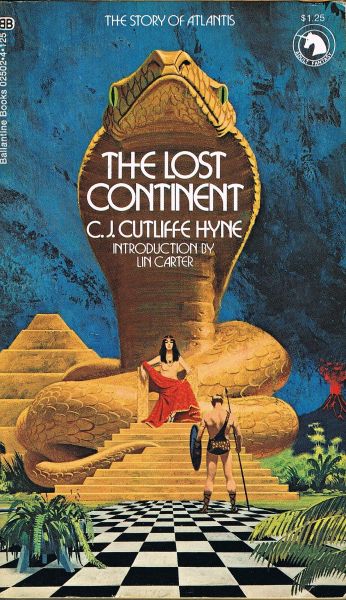Set Sail With Me
The Lost Continent
By C. J. Cutcliffe Hyne

21 Jul, 2024
C. J. Cutcliffe Hyne’s 1899’s The Lost Continent is a stand-alone tale of Atlantean tragedy.
Coppinger is an avid amateur archaeologist, a man who understood immediately the historical significance of the ancient documents found in a Canary Islands cave. Alas for posterity, the person who actually explored the cave was Coppinger’s unnamed companion, whose off-handedly brutal handling of the relics inadvertently destroyed a good part of them. Nevertheless, what remains paints a vivid picture of the final days of fabled Atlantis.
Pious, austere priest-general Deucalion has been pleased to govern Yucatan on behalf of Atlantis. His twenty-year reign ends when the empress orders Deucalion replaced. Deucalion is to return to the mid-Atlantic continent he has not seen in a generation.
Deucalion’s successor, Tatho, is gracious enough to warn Deucalion about what awaits stern Deucalion.
Swineherd’s daughter Phorenice used luck, skill, and naked ambition to claw her way into power. The empress of Atlantis is its first woman ruler. Nor, as will become apparent, is being empress sufficient for the ambitious swineherd’s daughter. Phorenice is determined to become a god!
It is easier to become a ruler than it is to be a ruler. Phorenice has alienated the Priest Clan to which Deucalion belongs. Her economic mismanagement has created legions of miserable poor who even now rise up against her. Perhaps due to her custom of executing anyone who delivers unwanted news, Phorenice is oblivious to the calamity bearing down on her and Atlantis, seemingly confident she can overcome any obstacles between her and her goals.
Deucalion has the right assortment of virtues to sway the empress, including one the puritanical bachelor might not have considered. He is brave, able, forthright, and the perfect candidate to be Phorenice’s consort. Although love is an alien word to both Deucalion and Phorenice, that does not matter for a cold-blooded state marriage.
Here unforeseen complications appear. Neither Phorenice nor Deucalion are immune to the power of love. To her immense surprise, Phorenice is smitten with her stern spouse-to-be. To Deucalion’s equally immense surprise, Deucalion also falls in love… with Phorenice’s foster sister, the virtuous rebel Nais.
Phorenice is not unreasonable. Deucalion may love anyone he likes, as long as he marries Phorenice and inters his true love in a chamber under Phorenice’s throne, where the prisoner will surely perish slowly and miserably in the dark. Deucalion obeys… but he has a secret ruse to save Nais.
Deucalion’s ruse is not half as secret as it needed to be. The result? Calamity on a mythic level.
~oOo~
I would like to formally apologize to Nais’ sister Ylga, who happens to be Phorenice’s fan-girl (in the sense of cooling her with a fan; she’s not an enthusiastic supporter of the empress). Poor Ylga is an also-ran in the tangle of infatuation centered on Deucalion. I couldn’t work out how to cram her into the synopsis. In my defense, it doesn’t really seem like the author knew how to fit her into the plot. Her role is to convey information while being more virtuous than Phorenice but not as virtuous as Nais.
Deucalion was a peerless governor from Atlantis’ point of view. The text suggests those he ruled might have been less impressed. To quote:
Myself, I am no pamperer of the common people. I say that, if a man be left to hunger and shiver, he will work to gain him food and raiment; and if not, why then he can die, and the State is well rid of a worthless fellow.
Like other heroic products of the 19th century, Deucalion is enormously and comprehensively bigoted towards anyone outside his particular social strata. Choosing not to be a male Atlantean priest is, in his eyes, a contemptable personal failing. What makes Deucalion stand out at least a little is that he repeatedly hurls opprobrium at the hopelessly savage Europeans, who he feels are suitable only for slavery… barely1.
Were authors like Edgar Rice Burroughs inspired by this book, which combines furious action with astonishing plot-enabling coincidence? Did Jane Gaskell take notes on this book, as both authors’ Atlantean settings feature a curious abundance of dinosaurs (a heroic rejection of the geological record)? No idea. What did amaze me was the assertion that Joseph Conrad’s Heart of Darkness “borrowed whole phrases, key episodes, and images” from Hyne’s Captain Kettle stories.
Perhaps because I read this at a less impressionable age than did Lin Carter (who provided an enthusiastic introduction to the edition I have in hand), I found The Lost Continent mainly of historical interest. It did have one memorable sequence, however: the first-hand narrative by the archaeologist’s companion of how the companion rediscovered Deucalion’s account millennia after Deucalion hid it, and how thanks to a combination of ignorance and carelessness, the companion managed to destroy most of it.
The Lost Continent, being very old, is available for free here (Project Gutenberg) and here (Standard Ebooks).
1: I did wonder if the author, Hyne, would reveal that the British were descended from Atlanteans and so not really European. Deucalion never reveals where he and Nais ended up. In fact, Hyne’s framing sequence seems designed to conceal that detail.
